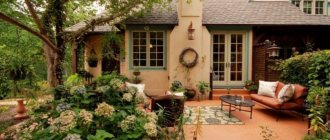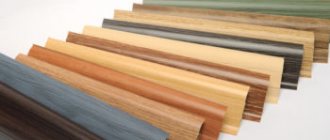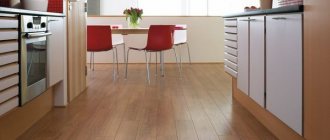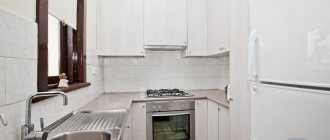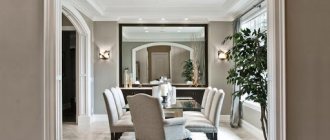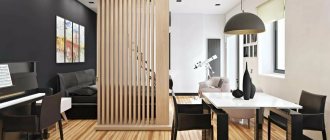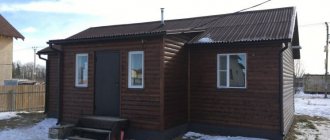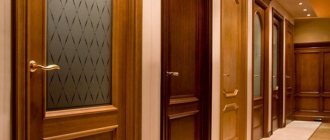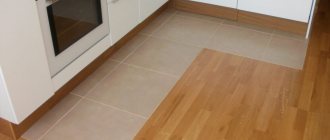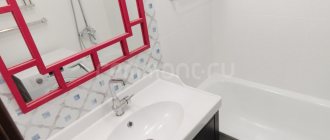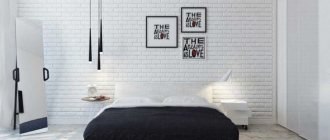Most designers unanimously claim that a kitchen without a door is the most current solution, taking into account the widespread fashion for combining it with a living room, dining room or corridor. Among the arguments are more efficient use of space, visual increase in area, and proper zoning.
This solution also has disadvantages - and for some they can be decisive. Some people are frightened by the situation in which they will have to “enjoy” the smell of fish that a family member is cooking - and neither a strong hood nor wide open windows will save you from such an aroma. Someone is not ready to give up personal space, which is only in the kitchen.
The theme of designing a doorway without a door between the kitchen and the living room or corridor has never been more relevant. In this article we will try to highlight all the nuances and pitfalls.
Features of an interior without doors
A doorway without a door is a popular design technique. This is a practical and fairly inexpensive way to increase usable space and use it more intelligently. By choosing the right finish, you can turn an ordinary opening into a spectacular and unique interior detail.
In what cases would such a method be relevant?
- If necessary, separate the food preparation area from the living room area.
- When zoning large areas.
- When combining adjacent rooms.
Video description
Walls made of aerated concrete for the winter without a roof.
If there are no drafts, then there is a possibility that evaporation from the soil will penetrate the building material from the inside.
An unfinished frame house made of wood is left for the winter for natural shrinkage Source remontnik.ru
On a note! You should not try to shelter vertical structures from slanting rain. This is a waste of resources and effort.
Advantages and disadvantages of an opening without a door
A free doorway, not cluttered with doors, has a sophisticated and stylish look. This design is used both in small two- and three-room apartments, and in large-sized cottages and mansions. Let's figure it out - what is the advantage of such a solution?
Pros of not using interior doors:
- Visual expansion of space, which is a significant advantage in small apartments. The absence of a barrier in the form of a door between the dining and kitchen areas, entrance and living room, allows you to move and maneuver faster and more freely.
- This frees up the unused area behind the open door leaf. When the canvas is removed, you can place any piece of decor or furniture in this place. For example, a vase, column, cabinet.
- An area is formed that can be advantageously decorated using a variety of materials. There are plenty of options for decorating the opening.
- Passages decorated in the same style create the feeling of a complete interior ensemble.
- Free air circulation is ensured, which is very important in the heat.
The main disadvantage of unlimited space is the inability to be in a private atmosphere. But this problem is easily solved with the help of a variety of curtains. And if the apartment has a more secluded place - a bedroom or an office, it is better to retire and restore peace of mind in such a closed room.
The following disadvantages can also be identified:
- lack of soundproofing barrier;
- the aromas will spread throughout the house;
- unimpeded penetration of drafts.
Thread curtains
One of the varieties of curtains are products made from threads for decoration. Thanks to the use of this option, you can achieve a feeling of lightness in the interior. Such curtains are almost weightless and do not interfere with the passage.
Curtain thread as decor
Such curtains fit perfectly into the interior of the premises. Such curtains will be an excellent alternative to conventional doors. They harmoniously combine with furniture and other interior items.
In what cases can you do without doors?
Not every opening in the house can be stripped of its door leaf. It is difficult to imagine an open passage to a bedroom, office or storage room. However, in this case, you can get by with sliding partitions, screens, curtains, and with their help create an intimate atmosphere. As a result, the visual separation of rooms will be realized and privacy will not be affected.
Door panels are removed if it is necessary to combine:
- kitchen and living room;
- living room and corridor;
- kitchen or living room with loggia;
- bedroom with dressing room.
The rectangular shape of the opening can be preserved and made more interesting through effective finishing. Often apartment owners prefer arched openings of regular and irregular shapes. Asymmetrical variations, round, triangular and trapezoidal portals are in great demand.
Door panels are abandoned if they plan to decorate the passage using stained glass and mosaic modules or a bar counter. Such techniques are especially often used in studio apartments.
As a rule, the decision to abandon doors is associated with the need to redevelop the premises. To create such a design, use:
- expansion of the existing opening;
- creating something new.
An open passage in a load-bearing wall allows you to unify the space while maintaining the rigidity of the building structure.
Vertical blinds
In order to save internal space, the developers came up with this option for replacing an interior door. The advantages of such designs include:
- a variety of models that are made from both cheap and expensive materials;
- you can choose any color that matches the interior;
- ease and simplicity of control;
- reasonable price of the structure.
Vertical blinds
Disadvantages include poor noise insulation and a low degree of reliability.
Plastic blinds
If you decide to replace the door to the room, then there are plenty of choices to change the interior. You just need to decide on your desires and financial capabilities.
Voted over 182 times, average rating 4.8
Comments
Unfortunately, there are no comments or reviews yet, but you can leave your...
Add a comment Cancel reply
We recommend reading
Locks, Miscellaneous Which mortise lock to choose for maximum protection of a wooden entrance door? Mortise locks differ from other types of installation methods. They …
Doorway, Locks, Miscellaneous How to measure a doorway for high-quality installation of an interior door? Installing door structures is a process that takes...
Locks, Miscellaneous How is the lock cylinder of a metal entrance door replaced depending on the mechanism? The front door is used every day, that’s why it and its components...
Locks, Miscellaneous Step-by-step instructions for removing a balcony door to be replaced During renovations in an apartment, office or any other room, often ...
Doorway design ideas
The market offers a huge selection of materials for designing free door portals. If you cannot find products that will optimally fit into the interior, you can make them yourself from scrap materials. You can use any materials that are used for wall decoration. The cheapest option is plasterboard structures, the finishing of which can be paint or wallpaper. This finish is especially relevant when installing sliding systems or making an asymmetrical passage. Panels made of plastic or MDF are also inexpensive. The most expensive materials used to decorate doorways are stone, ceramic tiles, valuable wood, and gypsum stucco. As an alternative to the door leaf, you can use curtains from a variety of materials, blinds, and mosquito nets.
When selecting material for this type of work, it is necessary to take into account the general style direction of the interior. The design should fit organically into the design of the room.
Fabric curtains
Textiles are one of the most popular space dividers, which are used to decorate a doorway. They give the interior freshness, style and beauty. The main advantage of curtains is that they are an excellent decoration and a continuation of the design concept. Correctly chosen color, print and texture of the canvas are the key points that allow you to maintain the style of the room. Designers recommend using several panels to create an interesting composition. Don’t forget about accessories for curtains – tiebacks, tassels, decorative cords, lambrequins.
With the help of such a decorative technique, it is good to decorate open spaces - if it is necessary to combine the room, the curtains can be easily pulled back and secured with tiebacks.
To create curtains, you can use both natural and synthetic fabrics. The first option is especially popular. Curtains made of cotton, linen, silk, satin, satin look expensive and emphasize the status of the apartment owner.
If it is necessary to ensure a sufficient level of thermal insulation, you need to choose the most dense curtain fabrics. All light and airy materials perform only a decorative function.
To fix the curtains, use ordinary window curtain rods or metal tubes attached to the wall above the opening. In the latter case, the curtains must be equipped with:
- grommets;
- ties;
- loops.
The tubular curtain rod should be easy to remove so that the curtains can be washed regularly.
Filament curtains
If you want to create a beautiful and extraordinary design for interior portals, you can use thread curtains. They are made from a huge number of synthetic cords. The threads are united at the top, and their ends hang freely. Such curtains can be used as an independent interior object or as an element of a composition in combination with other materials.
Thread products are made from high-quality polyester, which allows them to maintain their shape, integrity and attractive appearance.
The material has:
- excellent light transmittance. Since the canvas is not continuous, it cannot effectively block the passage of sunlight. This is ideal for poorly lit rooms on the north side;
- light weight – the load on the cornice is minimal;
- transparency - visually make the room more airy;
- versatility - they look great in almost any style, both classic and modern.
Thread curtains can be decorated with lurex, beads, bugles, and large beads, which makes them even more attractive.
Curtains made of bamboo and wood
Curtains made from bamboo sticks or pieces of wood look great in an interior opening. Individual elements are painted in a specific color. It is possible to apply a large pattern to the entire canvas. The bamboo doorway curtain consists of approximately 100 bamboo beads. Sticks and pieces of wood are connected together with staples or wire. You can string them on fishing line or cords. In this case, a metal stop must be installed after each fragment to prevent it from slipping. The degree of transparency of the fabric depends on the size of the intervals for placing beads.
Such curtains are not strong enough, so they should not be used if small children and pets live in the house.
Such curtains will be more convenient if they are placed only at the edges. You can hang short threads in the center, which will not impede movement.
It is not difficult to secure such curtains. You need to nail them to the plank placed above the opening.
Blinds
Properly selected blinds are an excellent solution for decorating a passage. Models with drawings really decorate the room. The advantage of blinds is that they are easy to care for - they can be easily wiped or washed. Standard window models will not fit in size, so door products will have to be ordered. The color palette of the material is very diverse, which allows you to choose products to suit any room design. You can combine several colors and make an original composition.
For high traffic conditions, it is better to use vertical products - they are easier to move. If the room is visited infrequently, you can purchase horizontal analogues.
Roller blinds
The material of a correctly installed curtain is tightly adjacent to the door portal, so this type of curtain is very convenient. The material is very diverse in terms of stylistic orientation and proposed dimensions.
The products are equipped with a weighting agent, thanks to which they maintain a stable position when closed. The only inconvenience is that raising such a curtain takes quite a lot of time, so you won’t be able to leave the room quickly. Although, if you close the canvas only at night and keep it open during the day, this inconvenience is not felt.
Wood paneling
This type of decoration is an integral element of most historical styles. For finishing, oak, ash, pine, and hornbeam wood is used. You can purchase the parts ready-made. During installation, they are fixed using nails or self-tapping screws.
Decorative panels
An excellent decoration for classic interiors can be a decorative cornice protruding above the opening. It is called “sandric” and consists of stucco elements - moldings, bas-reliefs, and may contain fragments of statues. To make this decoration, gypsum and polyurethane varieties of material are used.
Decorative tiles
This type of cladding is significantly heavier than polyurethane and wood. At the preliminary stage, the walls must be leveled with putty. The adhesive is selected depending on the size of the tile. Lightweight modules can be attached using liquid nails. For weighty options, you will have to prepare a special adhesive mixture. They begin to veneer from the bottom, with breaks for each row to set. The seams are filled with grout in the same color as the tiles or in a contrasting color. In addition to tiles, you can use artificial stone or clinker tiles. A mirror design that will further expand the portal and fill the room with light will look great.
MDF and plastic panels
Using MDF panels you can create an excellent and affordable finish. You just need to choose trims and trims that are similar in shade. Among the disadvantages of such cladding, one can highlight the poor moisture resistance of the material. Therefore, it is better not to use MDF boards to decorate the passage to the kitchen. However, if there is good exhaust hood, dampness will not threaten the integrity of the finish. It will also protect neighboring rooms from the penetration of food odors. You can also protect the material with self-adhesive film.
Plastic panels, on the contrary, are ideal for decorating the passage to the kitchen, as well as to the hallway, where there is a high risk of mechanical damage.
The panels are attached with glue or lathing made of wooden slats. They can be easily cut with a hacksaw. The advantages of the material include a variety of colors and textures.
Anti-mosquito curtains with magnets
Mesh curtains are indispensable in the summer, when you need to protect yourself from dust and insects. They do not create barriers to air flow and open easily simply when passing through them. The curtains are connected using a magnet, which automatically closes after allowing a person to pass through. This is incredibly convenient if your hands are full.
Why is freezing harmful?
A door that “sweats” will lead to the following consequences:
- The wood (if the structure has wooden parts) swells and swells, the edge comes off and decorative elements come off.
- Unpainted metal (if the paint is knocked off somewhere) rusts.
- When moisture appears on the lock, rust will form on it.
- Skewing the canvas or box leads to jamming of the lock.
- When a large amount of ice freezes on the canvas, the load on the hinges increases.
- The door does not open and close well due to the door being skewed.
- In the friction area (due to misalignment), the paint peels off.
- The frost that forms inside melts and flows onto the floor in the hallway.
- The freezing structure blows cold, so heating costs have to increase.
- The appearance deteriorates (finishing materials peel off).
- After particularly frosty nights, you may not be able to get into the house, as ice appears on the canvas and the box, and they freeze together.
Ways to close a doorway instead of a door
When starting a grandiose redevelopment, do not rush to block all the doorways that seem unnecessary at first glance. We suggest considering one of the options for their use.
False door
A non-standard solution that gives the interior originality. The door turns into a “trick”. The passage is sealed only on one side. This technique will allow you to play a trick on the guests and deceive the inspection services. This door can be used for sticky notes, or as a separator for a special area - for reading or working.
Hidden closet in the doorway
A wonderful option that does not require complex execution. The door and the jamb remain in place, and the opening itself is deepened as much as possible. The result is a small storage facility. It can be equipped with shelves and store canned food and other necessary things here - needlework kits, old toys, dishes. Among the disadvantages of this solution are the following:
- the niche cannot be made deep enough;
- if a ledge has formed into another room, you will have to beat it.
Built-in wardrobe
The space deepens due to the adjacent room. It is better to give preference to a glass door. Shelves should be mounted along their entire height. You can store sets, cosmetics, jewelry, books, and various decor here. The content depends on the location of such a cabinet.
Doorway design: niche with shelves
Usually, installing a decorative niche requires a lot of effort. You have to create a structure from plasterboard, which is mounted on a metal frame and “eats up” the space quite well. An unused doorway can successfully act as such a niche. To do this, you will need to dismantle the door - completely or partially - leaving the lower part. In the resulting space, you can organize shelves and build lighting.
Secret door
An interesting extravagant solution that will undoubtedly make your home mysterious and exotic. A secret door can be used to disguise a room where you do not want strangers to enter. Hidden behind a shallow sliding cabinet, it will remain a secret for your guests. None of them will guess what is actually hidden behind a small shelf of books or decor.
Design tips
When choosing fabric, fasteners and curtain model, it is recommended to follow the advice of designers:
- If you plan to remove a massive closet or dressing room door, then before installing a lightweight door, you can experiment with curtains. What if you like this option so much that you no longer need a new lightweight door instead?
- When calculating the size of the curtain and fastenings, it is important to ensure that the fabric covers the opening and that there are no gaps on the sides. And with the curtains pulled back, the interior contents of the cabinet or dressing room were not visible from the outside.
- Opaque fabrics are preferable to transparent ones.
- The shade of the curtains should not cast a bright reflection on the face of the person who chooses the clothes, otherwise you can make a mistake with the choice of colors. Outsider colors for curtains include purple, mustard, green and red.
- If possible, it is advisable to organize a fitting space in the dressing room with a mirror and a bedside table.
- In addition to the general curtain for the dressing room, you can build separate curtains for different groups of shelves. For example, to separate things by season, by family members, etc.
- It is advisable to select curtains for open cabinets and shelves from wrinkle-resistant material.
- The color scheme of the curtains on the doorway should be consistent with the shades used in the interior.
- Storage of the child's belongings can be provided in a separate closet without doors, which is not always acceptable. If there are curtains, it may be easier for the child to manage them, and there is no chance of getting his fingers pinched.
- It is advisable to provide the dressing room with additional lamps, even if it is located near the window.
- The contents of the dressing room should be in order and systematized.
Curtains for wardrobes instead of doors can be a necessary measure or an original decorative technique, chosen deliberately. In any case, the use of curtains allows you to change the interior, enlivening it and giving it individual features.
Choosing a material for sealing a doorway
If you don't plan to use the doorway for storage, you can seal it up. In this case, you will have to decide the question of what material to choose for this purpose.
Consider the following options:
- brick;
- drywall.
Keep in mind that permission must be obtained to completely eliminate the opening.
Brick
Brick has undeniable advantages as the main material for sealing passages. It can be used to brick up openings both in load-bearing external walls and in interior partitions. And there is no particular difference whether these walls are made of reinforced concrete panels or brick. However, we note that it is unlikely that openings in panel houses will be allowed to be moved. But when a room has two entrances, one of them can be abandoned. There are also buildings where there is a section in the load-bearing wall that can be knocked out and thereby form a new portal.
The disadvantage of using brick in aerated block, asbestos-cement or gypsum construction is that the thickness of half the brick does not correspond to the thickness of the wall. Therefore, differences are formed that have to be corrected with plaster. This creates certain problems. You can also try laying the brick on its edge, which is important for thin partitions up to 8 cm. The difference with this method will be only 1 cm.
This difference can be easily removed by increasing the thickness of the plaster layer. If the wall thickness is 9-19 cm, you need to take a one-and-a-half brick with a height of 80 cm and, similarly to the previous option, lay it on its edge. In this case, the thickness of the patch should be less than the thickness of the main structure. The main thing is that the masonry does not protrude beyond the plane of the surface. This will significantly reduce the consumption of plaster mixture.
Before you start laying the passage with piece masonry material, you need to start preparing the base and end surfaces. There should be no threshold or remnants of flooring below. Ideally, the base should be a concrete slab, which should be covered with one layer of roofing felt.
It is necessary to make notches on the new masonry. This will allow it to better adhere to the old one. When sealing a brick wall, you should remove some of the old mortar from the ends, or better yet, slightly knock down the corners of the bricks to form grooves. After this, the surface must be thoroughly dusted and moistened with water or primed. Only after this is it possible to begin sealing the hole.
The laying is done in a standard way with tying the seams. Sometimes long nails are driven into the gaps of the old masonry to drive their free edge into the new one. But this is optional. To fasten the elements, a cement solution is used.
Some craftsmen make recesses in the old masonry in order to insert newly laid bricks into them. Thanks to this, a stable connection is formed between the wall and the new formation. Each subsequent row of bricks must be shifted relative to the previously laid one.
In this case, the strength of the constructed structure will be ensured. The thickness of the solution is carefully adjusted - it should be within 12-14 mm.
After the second or third row, the evenness of the masonry is checked using a building level. You need to make sure there are no distortions. Having sealed the wall with brick, you can rest assured of the excellent soundproofing properties of the “patch”.
Drywall
Alternatively, you can use drywall to seal the walls. It is used when the strength and soundproofing qualities of the structure are not of great importance. With the help of this material, work on sealing the opening can be done in the shortest possible time. In this case, you do not need to have any special professional skills. An undeniable advantage is the affordable cost of the material.
When sealing the passage with plasterboard, you will need to build a frame from a metal profile. Four guides 3-4 m long will be enough. The profile is mounted around the entire perimeter inside the opening in two parallel rows. Fastening to the wall is carried out using dowel-nails 6x40 mm. The products are connected to each other using self-tapping screws equipped with a press washer.
It is necessary to remove the surfaces of the laid area. The guides must be installed at a distance of 12.5 mm from the edge. This distance should take into account the thickness of the gypsum board sheet. Then you need to install crossbars from profile scraps at a distance of 60 mm. You will get a frame to which sheets of drywall will be attached. The gaps can be filled with insulation, which will provide the required level of sound insulation.
It is more correct to use whole sheets of dry plaster, but if desired, you can get by with separate fragments. But do not forget that they need to be joined only at the locations of the crossbars.
To form high-quality joints, an edge plane is needed. With its help, the chamfer can be removed at an angle. Such joints are the easiest to seal properly.
In order to cut solid fragments from plasterboard, you will need a knife with a reinforced blade. Before cutting the material, markings must be applied to its top layer. Next, the leaf shell is cut along this line. After this, the slab is broken, after which all that remains is to cut the cardboard layer from the back side.
The next step is to apply the drywall to the frame and screw it with self-tapping screws at intervals of 20-25 cm. The screws must be screwed in without excessive force so as not to damage the shell of the material. Next, the seams between the gypsum board elements are sealed - in case the cladding was not installed from a single piece.
For finishing you will need a primer mixture, putty and fiberglass reinforcing tape. We treat the seams with a primer, fill them halfway with gypsum mortar and glue the tape, pressing it into the plaster. Next, we putty the sheet over the entire area and leave it for finishing.
What to do if additional insulation is not enough?
A well-insulated exterior door should not allow an ounce of cold air into the room, nor should it let heat out. But you may encounter the fact that you seemingly did all the work correctly, but the expected result was not achieved. What could be the reason?
First of all, pay attention to whether the door leaf was positioned correctly during installation, and whether there are any gaps left in the foam. Both reasons equally lead to a violation of the sealing of the entire structure.
To determine the quality of foaming and find the gap, use the traditional folk method: light a candle and slowly move along the joints of the door frame. Even the smallest draft will begin to oscillate the flame, thereby pointing you to the remaining gap.
In order to properly adjust the door leaf, you will need a set of hex keys and socket wrenches.
The adjustment is carried out using canopies, of which there are usually 4-5 pieces on the door. Each canopy is secured with a locking nut and four bolts. Adjustment work is carried out as follows:
- lower the adjusting nut on all hinges;
- lower the bolts using a hexagon and align the blade;
- tighten the bolts and secure their position with a nut.
Unlike work on insulation and installation of doors, adjustments can be made in any weather conditions, but severe cold may cause additional adjustment of the awnings in the summer.
What are they for?
Their need is due to the following factors:
- The main purpose of the door, which is installed in the storage room, is to protect the storage from direct sunlight, dust and moisture.
- The pantry is often located in places where there are no windows, so the door leaf must ensure normal ventilation of the room. In this case, you should carefully and thoughtfully approach the choice of the material from which it will be made.
- When choosing a door to a storage room, it is necessary to take into account the area of the room, because the purpose of the door directly depends on the size of the apartment.
- In a “Khrushchev” building, which has very modest dimensions, preference in the choice should be given to designs that allow you to save space or visually expand it.
- For narrow openings, it is advisable to choose systems that will not block the passages and can provide space.
- In a miniature apartment, it is necessary to install doors that visually increase the area of the room as a whole.
- In addition to useful functions, the door to the pantry can also serve an aesthetic role.
An ordinary canvas hiding storage can be turned into a beautiful and original interior decoration that attracts the attention of guests.
